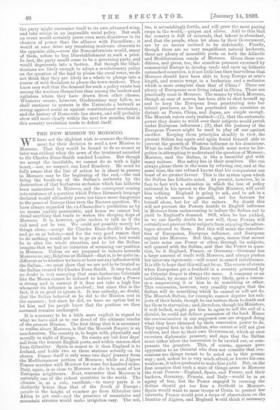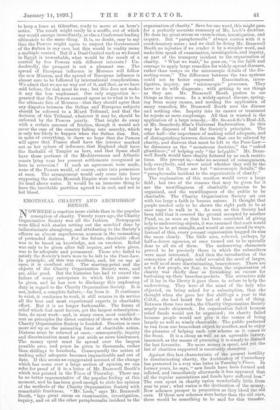THE NEW MISSION TO MOROCCO.
WE have not the slightest wish to censure the Govern- ment for their decision to send a new Mission to Morocco. That they would be bound to do so sooner or later was evident when the news of the treatment accorded to Sir Charles Euan-Smith reached London. But though we accept the inevitable, we cannot do so with a light heart,—nor, we suspect, can Lord Rosebery. He must be fully aware that the line of action he is about to pursue in Morocco may be the beginning of the end,—the end being the break-up of the Sultan's authority by the destruction of that barbarous seclusion which has hitherto been maintained in Morocco, and the consequent coming into existence of a question which Prince Bismarck long ago declared would ultimately prove ten times more dangerous to the peace of Europe than even the Eastern question. We have always regarded the ex-Chancellor's prediction as by no means unduly pessimistic, and hence we cannot but dread anything that tends to waken the sleeping dogs of Morocco. It is, however, quite useless to talk as if the risk need not be run. We could not possibly merely let things alone,—accept Sir Charles Euan-Stnith's failure, and go on as before,—and for the very good reason that to do nothing would not be to go on as before, but would be to alter the whole situation, and to let the Sultan imagine that we had no intention of retaining our position in. Morocco. Unless we are prepared to behave towards Morocco as, say, Belgium or Holland—that is, to be quite in- different as to whether we have or have not any influencewith the Sultan,—we must show that we are not to be treated as the Sultan treated Sir Charles Euan-Smith. It may be, and no doubt is, very annoying that semi-barbarous Orientals like the Moors cannot be induced to believe that a Power is strong and in earnest if it does not take a high line whenever its influence is involved ; but since this is the fact, it is no good to ignore it. It was unlucky, no doubt, that the Sultan behaved as he did to the Mission sent in the summer ; but since he did, we have no option but to let him and his people know that the position we then assumed remains unchanged.
It is necessary to be a little more explicit in regard to what we have said as to our dread of the ultimate results of the present Mission. The first thing that it is necessary to realise about Morocco, is that the Moorish Empire is an anachronism. The country is, to begin with, physically and morally in sight of Europe. Its coasts are but four days' sail from the nearest English ports, and within cannon-shot from Gibraltar. Spain is nearer to it than England is to /reland, and holds two or three stations actually on its shores. France itself is only some two days' journey from the Mediterranean portion of Morocco ; while in Algiers France marches with Morocco for some five hundred miles. Italy, again, is as close to Morocco as she is to most of her European neighbours. Next, remember that Morocco is naturally one of the richest countries in the world. The climate is, as a rule, excellent,—in many parts it is distinctly better than that of the South of Europe ; people in the height of summer go from Gibraltar into Africa to get cool—and the presence of mountains and mountain streams would make irrigation easy. The soil, too, is astonishingly fertile, and will grow the most paying crops in the world,—grapes and olives. Add to this that the country is full of minerals, that labour is abundant, and that the people, when let alone by their Government, are by no means inclined to be unfriendly. Finally, though there are no very magnificent natural harbours, there are plenty of accessible ports on both the Atlantic and Mediterranean coasts of Morocco. Given these con- ditions, and given, too, the ceaseless pressure exercised by commercial Europe to develop trade and open up hitherto untouched countries, is it not little less than marvellous that Morocco should have been able to keep Europe at arm's length, and remain wrapt in a, barbarism and a seclusion which is more complete than that of China ? There are plenty of Europeans now living inland in China. There are practically none in Morocco. The means by which Morocco, though so easy of access, has been able to shut herself up and to keep the European from penetrating into her inland provinces, as he has penetrated into countries so distant as Persia, China, and Japan, are simple enough. The Moorish rulers early realised—(l), that the autocratic power they desire to wield over their subjects would perish under European influences ; (2), that the jealousy of the European Powers might be used to play off one against another. Keeping these principles steadily in view, the present Sultan has again and again found himself able to prevent the growth of Western influence in his dominions. What he told Sir Charles Euan-Smith must never be for- gotten in attempting to understand the question of Morocco. Morocco, said the Sultan, is like a beautiful girl with many suitors. Her safety lies in their numbers. She can always please them in the mass by refusing one, and at the same time, the one refused knows that his companions can. boast of no greater favour. This is the system upon which the Sultan has hitherto acted. At present, however, he is face to face with a situation in which the line of policy indicated in his speech to the English Minister, will avail him nothing. England is going to ask, and to ask in a way which cannot be gainsaid, not for favours for herself alone, but for all the suitors. No doubt this will not prevent the Powers hostile to English influence in Morocco from endeavouring to induce the Sultan not to yield to England's demand. Still, when he has yielded, as we can hardly doubt he now will, these Powers will certainly not prevent their subjects from enjoying the advan- tages secured to them. But this will mean the introduc- tion of Europeans, European influence, and European capital into Morocco. But this, again, means that sooner or later some one Power or other, through its subjects, will quarrel with the Sultan, and that the Power in ques- tion, be it England, France, or Germany—Germany has a large amount of trade with Morocco, and always pushes her interPsts vigorously—will resort to armed interference. It is idle to hope that this will not be so. The course of events when Europeans get a foothold in a country governed by an Oriental despot is always the same. A company or an individual, by means of bribery very likely, gets a comes- sim empowering it or him to do something or other. This concession, however, very possibly engages that the Sultan will do something which he cannot or will not do. The Moorish Sultan, for example, cannot deprive his sub- jects of their lands, though be can torture them to death and tax them to starvation; and, therefore, though his Ministers, if well bribed, might get him to agree to sell the soil of a district, he could not deliver possession of the land. Hence the concessionaires in our supposed case are stopped doing what they have obtained by their concession power to do. They appeal first to the Sultan, who cannot or will not give redress, and then to their own Government, which at once exercises diplomatic pressure, and says that the Sultan must either allow the concession to be carried out, or com- pensate the grantees. This, of course, appears pure oppression to an Oriental who does not consider that con- cessions are things meant to be acted on in this prosaic way ; - and, unless he is very much afraid, or knows his own weakness, it takes gunboats to make him yield. But, on the first occasion that such a state of things arose in Morocco the rival Powers—England, Spain, and France, and their backers, Germany, Prussia, and Italy—would be in an agony of fear, lest the Power engaged in coercing the Sultan should get too firm a foothold in Morocco. Spain would want to mass troops at Ceuta to protect her interests, France would post a corps of observation on the frontier of Algiers, and England would think it necessary to keep a force at Gibraltar, ready to move at an hour's notice. The result might easily be a scuffle, out of which war would emerge immediately, or else a Conference leading ultimately to the same thing. It is, no doubt, easy to say that the Powers might agree to respect the Government of the Sultan in any case, but this would in reality mean a multiple control. But if a Dual Control such as we found in Egypt is unworkable, what would be the result of a control by five Powers with different interests ? Un- doubtedly, the prospect is not a pleasant one. The spread of European influence in Morocco will follow the new Mission, and the spread of European influence is almost sure to be followed by international complications. We admit that we see no way out of it, and that, as we have said before, the risk must be run ; but this does not make it any the less unpleasant. Our only suggestion is— granted that the Powers cannuot agree as to what is to be the ultimate fate of Morocco—that they should agree that any disputes between the Sultan and European subjects should be referred to a Mixed Tribunal, and that the decision of this Tribunal, whatever it may be, should be enforced by the Powers jointly. That might do away with a certain amount of friction, though it would not cover the case of the country falling into anarchy, which is only too likely to happen when the Sultan dies. But, in spite of everything, is there no hope that the Powers will agree that France shall have the interior marked out as her sphere of influence, that England shall have the Bashalik of Tangier as hers, and that Spain shall have those portions of the Mediterranean and Atlantic coasts lying near her present settlements recognised as hers in reversion ? If such an agreement were made, none of the Powers would, of course, enter into possession at once. The arrangement would only come into force supposing the native Moorish Empire were unable to keep its head above water. It would be an immense thing to have the inevitable partition agreed to in cool, and not in hot blood.



































 Previous page
Previous page